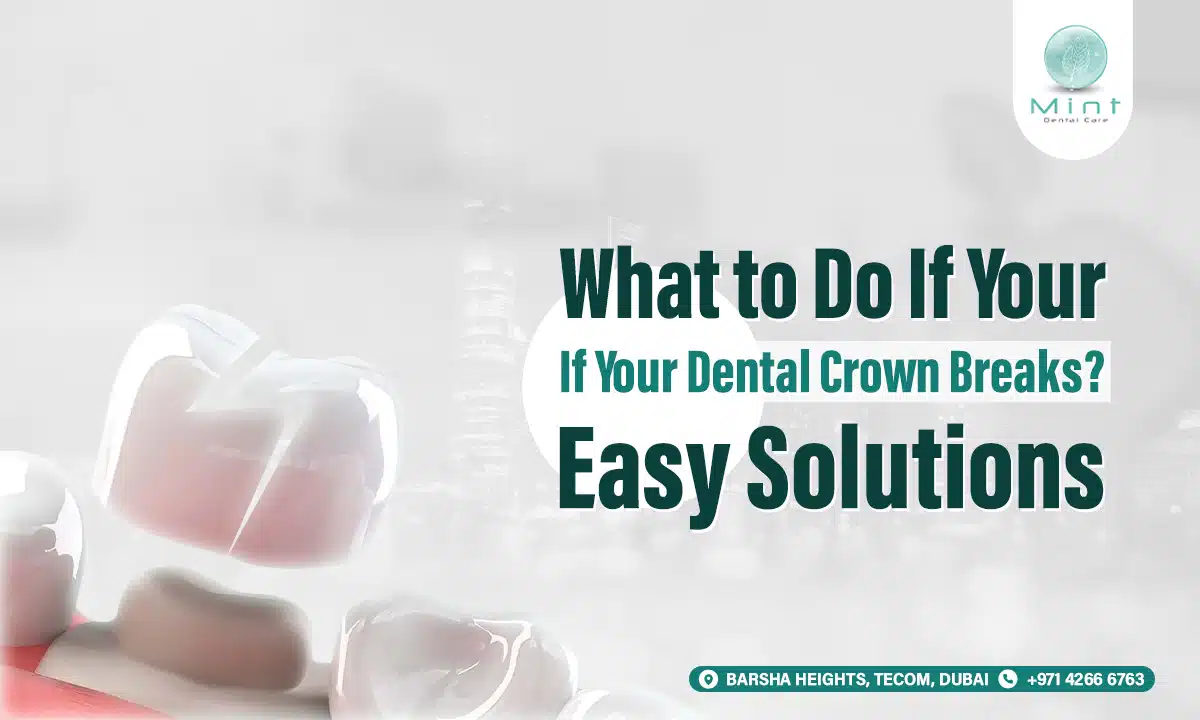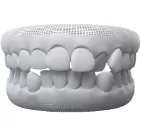Dental crowns are essential for restoring the functionality and appearance of damaged teeth. They are durable and designed to last, but like natural teeth, they are not indestructible. Accidents, biting on hard objects, or general wear and tear can cause a crown to break or crack unexpectedly. If this happens, it’s essential to act promptly to prevent further complications.
In this article, we’ll guide you through the immediate steps to take, temporary solutions you can use, and professional treatments available for a broken dental crown.
What Is a Dental Crown and Why Is It Important?
A dental crown is a cap-like structure placed over a damaged tooth to restore its size, shape, strength, and function. Crowns are commonly made from materials like ceramic, porcelain fused to metal, gold, or composite resin. They are especially beneficial for protecting teeth that have undergone extensive damage, such as fractures, large fillings, or root canal treatments.
But why are crowns so critical to dental health?
- Protection: Crowns shield the underlying tooth from further decay or damage.
- Functionality: They restore your ability to chew and speak effectively.
- Aesthetics: Crowns improve the appearance of a tooth, blending seamlessly with your natural smile.
When a crown breaks, it leaves the underlying tooth exposed and vulnerable to additional damage or infection, making prompt action vital.
Immediate Steps to Take When Your Dental Crown Breaks
If your dental crown breaks, it can be unsettling, but staying calm and following these steps can make all the difference:
- Retrieve the Broken Pieces
- Carefully locate and save any fragments of the crown. Your dentist might be able to repair or reuse them.
- Store the broken pieces in a clean container to take to your dental appointment.
- Rinse Your Mouth
- Rinse your mouth gently with warm water to remove debris and prevent infection. Avoid scrubbing or using harsh mouthwash.
- Protect the Exposed Tooth
- Use dental wax or temporary dental cement (available at pharmacies) to cover the exposed area and prevent sensitivity or further damage.
- Manage Pain and Swelling
- Apply a cold compress to the outside of your cheek to reduce swelling.
- Take over-the-counter pain relievers like ibuprofen to alleviate discomfort.
- Contact Your Dentist Immediately
- Call your dentist to schedule an emergency appointment. The sooner you act, the better your chances of saving the tooth and crown.
Have you prepared for dental emergencies? Knowing what to do ahead of time can save your smile!
Treatments for a Broken Dental Crown
Once you visit your dentist, they will assess the damage and recommend one of the following solutions:
- Reattachment
- If the crown is intact and the underlying tooth is still healthy, your dentist may clean both surfaces and reattach the crown using permanent dental cement.
- Repair
- For minor chips or cracks, the dentist may use dental bonding to repair the crown without replacing it entirely.
- Replacement Crown
- If the damage is extensive, a new crown will need to be fabricated. This may involve taking impressions of your teeth and placing a temporary crown while the permanent one is being made.
- Dental Onlay
- In cases where only part of the crown is damaged, a dental onlay (a partial crown) may be used to restore the tooth.
- Tooth Extraction and Implant
- If the tooth beneath the crown is severely damaged or decayed, extraction may be necessary. Your dentist might then recommend replacing it with a dental implant.
Common Causes of Dental Crown Breakage
Understanding why crowns break can help you avoid similar issues in the future.
- Biting on Hard Foods: Ice, nuts, and hard candies are frequent culprits.
- Accidental Injury: Blows to the face during sports or accidents can crack or dislodge a crown.
- Teeth Grinding (Bruxism): Habitual grinding weakens both natural teeth and crowns.
- Normal Wear and Tear: Over time, crowns can degrade, especially if made from softer materials like composite resin.
- Improper Fit: Poorly fitted crowns are more prone to damage and dislodgement.
Preventing Future Crown Breakage
While accidents can’t always be avoided, you can take steps to protect your dental crowns and maintain their longevity:
- Practice Good Oral Hygiene: Brush twice daily, floss regularly, and use an antibacterial mouthwash to keep your teeth and gums healthy.
- Avoid Hard Foods: Steer clear of ice, popcorn kernels, and similar hard foods.
- Wear a Mouthguard: If you participate in contact sports or grind your teeth at night, a mouthguard can prevent crown damage.
- Schedule Regular Dental Check-Ups: Routine visits allow your dentist to catch potential issues early, such as weakened crowns or developing decay.
- Follow Post-Treatment Instructions: Always adhere to your dentist’s guidelines for caring for a new crown to ensure it lasts as long as possible.
Frequently Asked Questions (FAQ)
Q1: How long do dental crowns typically last?
Dental crowns usually last between 5 and 15 years, depending on the material used and how well they’re cared for.
Q2: Can I eat with a broken dental crown?
It’s best to avoid eating on the affected side to prevent further damage. Stick to soft foods until the crown is repaired or replaced.
Q3: Is a broken crown a dental emergency?
While not always an immediate emergency, a broken crown should be addressed as soon as possible to avoid complications such as infection or further damage.
Q4: Will my dental insurance cover a replacement crown?
Coverage depends on your specific insurance plan. Many plans cover part of the cost for a replacement crown, especially if the existing one is several years old.
A broken dental crown can be a stressful experience, but with the right approach, it doesn’t have to turn into a disaster. Acting quickly by protecting the exposed tooth, managing pain, and contacting your dentist ensures a smoother resolution. Whether your crown can be reattached, repaired, or needs replacement, professional dental care in Dubai can restore your smile and confidence.
Remember, prevention is always better than cure. Maintaining good oral hygiene, wearing protective gear during sports, and avoiding hard or sticky foods can extend the life of your dental crowns. By being proactive and informed, you can safeguard your oral health and enjoy the benefits of a strong, beautiful smile.















